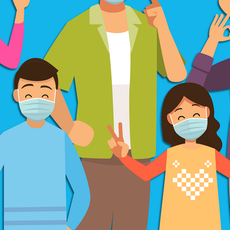Call for Papers: Ethics, children, education and the COVID-19 pandemic.
Call for Papers:
Ethics, children, education and the COVID-19 pandemic.
Online Workshop @Centre for Ethics and Poverty Research, University of Salzburg
Organizers: Jeff Frank (St. Lawrence University) and Gottfried Schweiger (University of Salzburg)
Dates: 28 and 29 September 2021, 3pm-7pm (Central European Time) / 9am-1pm (Eastern Standard Time)
Submission deadline for abstracts of 500 words: 30 June 2021
Please submit your proposal to both organizers: and
While children and adolescents have a much lower risk of becoming severely ill from COVID-19, the pandemic still has a serious impact on their lives. These include the closures of schools and childcare facilities and the switch to home schooling, which not all children and adolescents can manage equally well because they lack support, space, or technical equipment. The family again became the central physical and social space for children and youth. Families that are socially disadvantaged, live in crowded conditions, or experience stress, poverty, and violence face particular hardships during the pandemic. Social inequalities among children and youth are exacerbated as a result. The impact on the pandemic and the restrictions to contain it are mostly seen and judged from an adult perspective. The world of children and adolescents is often not recognized and possible losses, restrictions and disadvantages are minimized or not taken seriously. However, the life phase of childhood and adolescence is different from the life phase of adulthood. This is already expressed in the fact that educational losses caused by closed schools often cannot be made up for because there is no time to do so. In many respects, adolescent life has been curtailed, spaces outside the family and thus also opportunities for independence have become fewer, and contact with friends and also romantic partners has been reduced. However, it can also be assumed that the pandemic will have medium- and long-term consequences; above all, the social and economic consequences will negatively shape the opportunities for education, income and prosperity for some social groups for years to come. Attention should also be paid to the public, media, political discourse, how children and adolescents, their interests, rights and needs are talked about during and after the COVID-19 pandemic, and to what extent they have their own say in this discourse. It is to be feared that children and adolescents will not be taken seriously in this context, but will be dismissed with the reference to the fact that they have suffered no or only very minor damage to their health as a result of COVID-19. In this context, it would be important to consider not only the direct dangers of the pandemic in terms of death, illness and possible long-term consequences, but also the short-term, medium-term and long-term psychological, social and educational consequences. The social and political powerlessness of children is also reflected in this.
This workshop is dedicated to childhood and adolescence during and after the COVID pandemic from a specifically ethical perspective. Thus, it addresses questions not only of how the pandemic has changed childhood and adolescence and what consequences can be expected for children and adolescents, but also: what are the ethical and philosophical issues involved; what are the rights of children and adolescents in the face of the pandemic and have they been adequately addressed; understanding how to achieve a good childhood during and after the pandemic (also to be prepared for the next pandemic); how to address the losses of education and social opportunities that children and young people have suffered as a result of the pandemic and what practices and policies can be adopted to prevent wider social gaps and inequalities from arising; how should children and young people be talked about and how should they themselves be involved so that their experiences can also be heard socially, in the media and politically.
This will be a paper-based workshop and participants are asked to send their draft papers one week before the workshop to be shared among all participants. Draft papers should be between 4 and 6 thousand words, including references. Talks should not be longer than 20 minutes followed by 25 minutes q&a. We plan to publish the papers of this workshop.





